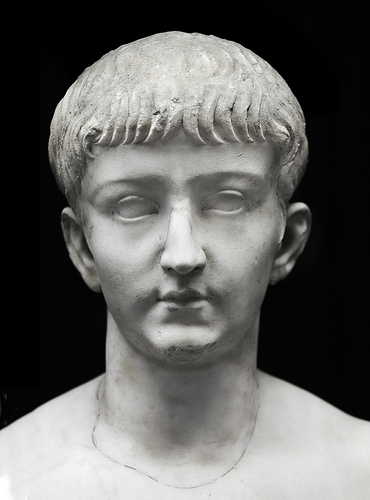The imperial reign of Claudius had been a great boon for the Roman Empire. After the golden age of Augustus, they had trudged through the fascist militarism of Tiberius and then faced the shocking insanity of Caligula. Claudius, believed by many to be a bumbling, stammering cripple, proved to be an effective leader upon his election by the Praetorian Guard. In the chaos ensuing from the assassination from Caligula, the Senate had been in an uproar, but Claudius' steady nerve affirmed his position.
Through his reign, Claudius had expanded the empire with conquests in Britain, earning him the honorific “Britannicus”, which he refused for himself but accepted for his oldest surviving son. He built public works such as aqueducts and conducted religious and judicial reform. Claudius's improvements went deeper still, furthering natural history with his own study and adding three letters to clarify the Roman alphabet. However, his reign was not without its shadows, such as the coup planned by his wife Messalina, mother of Britannicus, and her husband by bigamy, Gaius Silius. Britannicus, though still son of the emperor, was downgraded in opinion.
Claudius remarried, this time to his niece Agrippina the Younger to secure his position further by becoming a member of the Julian as well as Claudian family. Her son, Lucius Domitius Ahenobarbus, was a direct descendant of Augustus, and Claudius happily adopted him. Domitius was two years older than Britannicus, and public opinion fell gladly upon the handsome older lad. While publicly the marriage was satisfactory, Claudius and Agrippina argued constantly. As Britannicus approached manhood, the emperor considered divorcing her and having his oldest natural son be his official heir. The current will stated for Domitius and Britannicus to be co-heirs, an obvious problem.
On October 13, 54, Claudius died. It looked as if age and ill health had caught him, but many were suspicious of Agrippina and her many contacts who were skilled in the art of poison. Agrippina worked to perfect the transition of her son to be the lone emperor and under her control. She ordered the execution of Claudius's former slave, Narcissus, now a freedman who was loyal to the emperor, upon his return. Narcissus knew that his end would come, and he began a plan to burn all of Claudius's papers, but assassins caught him before his work could begin.
The papers were searched, and a will discovered that named Britannicus the lone heir and gave bonuses to the Praetorian Guard in celebration of his coronation. Agrippina moved to have the will annulled, but the threat of the Praetorians losing their income kept her actions at bay. Several months of stalled waiting crept through Rome until Britannicus officially gained manhood and his throne. Upon his ascent, he called for exile of Agrippina and Domitius alike, citing suspicions of conspiracy and illegal execution. Later, Domitius would be suspected of murdering his mother while she was boating.
Rome celebrated their young emperor, who took up advisers such as Seneca and Burrus, who was later banished as part of a conspiracy surrounding Britannicus's distant cousin Faustus. Britannicus treated Faustus well, and further suspicions never arose. With power continuing to consolidate as he grew, Britannicus worked to reform punishments and taxes. He did not spend as much as many said he should on city improvements, instead always looking toward the borders of Rome for expansion. Britain revolted under Boudicca, but Britannicus's generals put down the rebels and saved his namesake. Later, Rome went to war with Parthia over influence in Armenia. While advisers recommended peace because of struggles with grain supplies and the imperial budget, Britannicus conferred with his general Vespasian, and the invasion of Parthia began.
The next few years were tough in Rome with troops continually pouring eastward, but the plunder more than paid for the military action. Vespasian's son Titus, a friend from childhood of Britannicus, put down a revolt in Judaea and secured the loot from their golden temple as a side-expedition from the conquest of Parthia. The Flavian family would remain close to the Claudians for the rest of their dynasty.
The fire of 64 awoke Britannicus's attention to Rome itself. Its origin was blamed on Parthian agents, sending public opinion in great favor for the expensive war. With the shiploads of gold brought back from the Parthian palaces, Britannicus set to rebuild Rome better than before. City-planning and administration of the enormous empire consumed the remainder of Britannicus's rule.
Emperors would continue through Britannicus's son Julius Claudius in a dynasty that would last another century. Parthia would revolt successfully in the late-100s, and plague and drought would cause uproar throughout the empire in 235. With the assassination of the emperor and many of his senators, the empire would shatter into rival states such as Africa/Hispania, Italia, Gaulia, Germania, and Palmyrene. Civil war crippled these states, allowing outsiders such as the Rus, Kush, Celts, and Parthians to conquer lands away from them.
Political power became increasingly decentralized and destabilized, bringing a new dark age. The many religious groups each with their own figure, such as Isis, Christ, and Mithras, fought for supremacy while warlords secured territory through fear of force. It would not be until the introduction of trade along defended routes carved by the Nordic Vikings that prosperity returned to Europe in the ninth century.
–
In reality, Domitius would become emperor and be called “Nero.” Narcissus succeeded in burning Claudius's papers, and it is unknown whether he put into written contract that he had begun to favor Britannicus. Britannicus himself was co-heir, though not of age at the time of Nero's ascension, and would be murdered days before his fourteenth birthday and manhood.

No comments:
Post a Comment